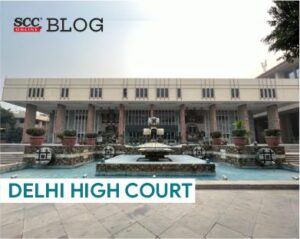Delhi High Court: In a petition filed assailing the action taken by the ED to pass a Provisional Attachment Order (‘Order’) emanating from an FIR registered by the CBI due to an allocation of the Fatehpur Coal Block located in the State of Chhattisgarh, on allegations of offences under Section 120-B read with Section 420 of Penal Code, 1860 (IPC) along with Sections 13(2) and 13(1)(d) of the Prevention of Corruption Act, 1988, Yashwant Varma, J., quashed the Order being violative of the statutory provisions and was held to be ‘arbitrary and illegal’.
FIR alleged that the petitioner had actively misrepresented in its application for allocation of a coal block insofar as disclosures with respect to net worth were concerned, I.e., the application had set out the net worth of the petitioner as being Rs. 532 crores, during the inquiry it came to light that its actual net worth was Rs. (-)144.16 crores at that time. It was further alleged that despite the Ministry of Power not framing any positive recommendations in favour of the petitioner, the Screening Committee constituted by the Ministry of Coal recommended the allocation of the coal block in favour of the petitioner along with its joint venture partner.
The Court noted that the principles enunciated in Vijay Madanlal Choudhary v. Union of India, 2022 SCC OnLine SC 929 as well as Prakash Industries Ltd. v. Directorate of Enforcement1, 2022 SCC OnLine Del 2087 concludes that an allegation of money laundering is premised on the commission of a criminal offence, and in case of absence of the commission of a criminal offence, the foundation of proceedings that may be initiated under the PMLA would “undoubtedly fall and self-destruct”
The Court further noted that the original FIR, the supplementary chargesheet as well as the Enforcement Case Information Report (ECIR) clearly evidence that they stand restricted to the alleged acts of misrepresentation and submission of incorrect facts by the petitioner in order to obtain an allocation in respect of Fatehpur Coal Block, and the allegation with respect to manipulation of share price and the proceeds that may have been obtained by the petitioner from the allotment of those preferential shares neither forms part of the FIR, the supplementary chargesheet nor the ECIR.
The Court found the reliance on judgment Himachal EMTA Power Limited v. Union of India, 2018 SCC OnLine Del 11078, to be inappropriate, and noted that since no mining activity had been undertaken, it could not be said that any proceeds of crime had been derived or obtained in the present case. Thus, the offences that could be said to have been allegedly committed by the petitioner by virtue of allotment of preferential shares do not form the subject matter of the proceedings drawn in respect of the predicate offence.
The Court recorded that what needs to be emphasized is that the PMLA empowers the ED to investigate Section 3 offenses only restricted to the offense of money laundering. However, the same cannot be read as enabling it to assume from the material that it may gather during that investigation, that a predicate offense stands committed. The predicate offense must be necessarily investigated and tried by the authorities empowered by law in that regard. Thus, ED cannot and on its own motion proceed on the surmise that a particular set of facts evidence the commission of a scheduled offense and based on that opinion initiate action under the PMLA.
The Court remarked that initiation of action under Section 5 of the Act is premised on the competent authority having reason to believe that a person is in possession of proceeds of crime. The evidence of criminal activity would be either a First Information Report, a complaint, or a charge-sheet as envisaged under various statutes. However, in absence thereof, it would be wholly impermissible for the ED to itself become the arbiter of whether a scheduled offense stands committed.
The Court remarked that the legislation strikes an important balance while dealing with such a contingency by empowering the ED to take emergent steps under Section 5 based on the material that it may have gathered during its investigation and at the same time placing it under an obligation to transmit the requisite information to the concerned agency for necessary action in terms of Section 66(2).
The Court concluded that it finds itself unable to recognize ED as being statutorily empowered to either try or examine whether an offence under any other statute stands committed nor can it and more importantly pass an Order on a mere assumption that an offence independently created under any other statute is established to have been committed.
Thus, the Court quashed the Order by holding that beyond an iota of doubt, Order rests on a mere presumption of the ED that a scheduled offense was committed by the petitioner while allotting preferential shares.
[Prakash Industries Limited v. Union of India, 2023 SCC OnLine Del 336, decided on 24-01-2023]
Advocates who appeared in this case:
Mr. Ankur Chawla, Mr. Gurpreet Singh, Mr. C.B. Bansal, Mr. Amir Khan, Mr. Shivam Tandon and Mr. Aamir Khan and Ms. Prerna Mahajan, Advocates for the Petitioner;
Mr. Zoheb Hossain and Mr. Vivek Gurnani, Advs. with Mr. Santokh Singh, DD and Ms. Kumud Ranjan, EO for ED.
*Arunima Bose, Editorial Assistant has reported this brief.
1. www.scconline.com/blog/post/2022/07/21/delhi-high-court-mere-allocation-of-coal-does-not-amount-to-proceeds-of-crime-u-s-21-u-of-pmla-2002-proof-of-monetary-gains-wrongfully-obtained-from-such-allocation-is-mandatory/

